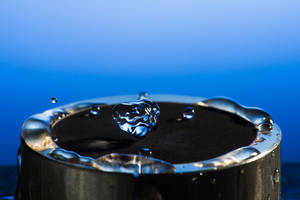A new super-water-repellent, super-light absorptive, self-cleaning metal has been produced by scientists in New York.
The super-metal could be used to make low maintenance, highly effective solar panels, toilets that don't get dirty and even waterproof electronics.
Writing in The Journal of Applied Physics, Prof. Chunlei Gou and his team from the University of Rochester, New York, used a high-powered laser to zap samples of titanium, platinum and brass.
This treatment produces a pattern of tiny "microgrooves" on the metal surface. These stop water sticking by reducing the attractive forces between the metal and the liquid. Instead, water molecules that land on the surface clump together and form droplets, which roll straight off.
The new technology can guard against corrosion and contamination. "If you can repel the water you can keep the metal rust free, prevent the metal from having ice form on the surface and also it doesn't get contaminated with water containing pathogens (germs)," points out Gou.
The key to the breakthrough is the femtosecond laser that etches the surface. It fires pulses that are only one millionth of a billionth of a second long. "During the short burst the peak power is comparable to the average power of the entire North American power grid," Gou reveals.
The laser burns a series of parrallel microgrooves, which on closer inspection are layered with complex nanostructures, resembling a pattern of microscopic waves covered in tiny grain like structure, into the otherwise smooth surface of the metal. Regular lasers would not be powerful enough to create this complex structure.
The technique isn't confined to expensive metals alone. The team are now working on ways to make the effect work on other metals, like aluminium or stainless steel and even plastics.
According to Gou, these could be used to produce water-conserving lavatories capable of cleaning themselves with a much smaller flush.










Comments
Add a comment